Have you ever wondered how local businesses appear at the top of search results when looking for nearby services?
The secret lies in effective local keyword research.
Nowadays, when online visibility can make or break a business, it is important to understand and utilize the right keywords to target your local audience.
Local keyword research involves identifying the specific terms and phrases potential customers use when searching for products or services in their area.
By understanding this process, you can significantly enhance your online presence, attract more local traffic, and ultimately increase sales.
In this post, we will discuss the essential steps needed to conduct successful local keyword research and ensure your business stands out in local search results.

Table Of Contents
1 What is Local Keyword Research?
Local keyword research is the process of identifying and analyzing the specific search terms used when looking for products or services in a particular geographic area.
This type of research is essential for businesses that serve local customers, as it helps them optimize their online presence to attract more targeted traffic from nearby searchers.
For instance, suppose you own a bakery in Seattle. Instead of targeting general keywords like best bakery or fresh bread, you can focus on local keywords such as best bakery in Seattle, Seattle fresh bread, or custom cakes in Capitol Hill Seattle.
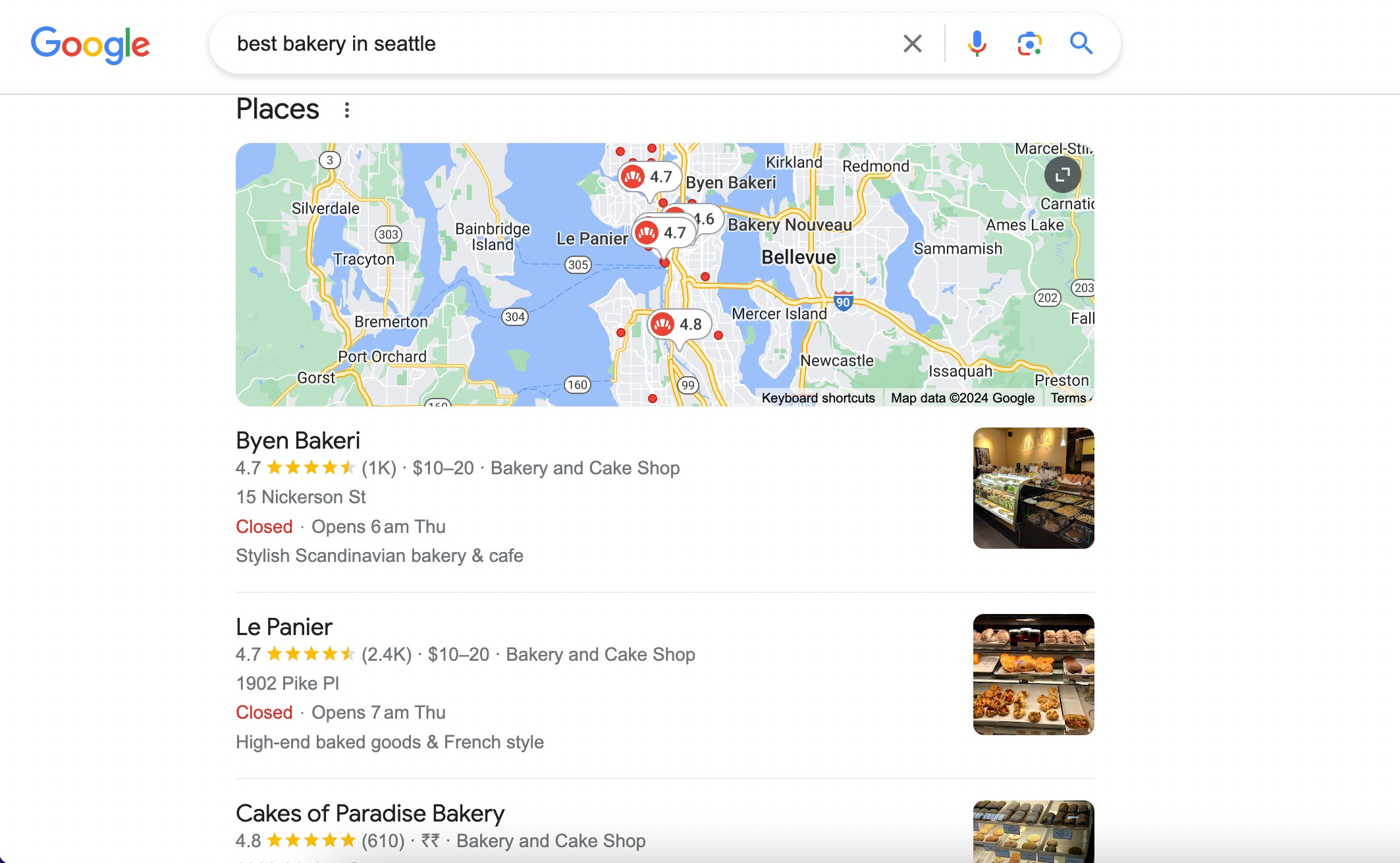
By including these locally focused keywords in your website content, blog posts, and online listings, you can improve your visibility in search results for audience specifically looking for a bakery in Seattle.
By using local keyword research, you can ensure that your online content is highly relevant to the target audience, thereby increasing the chances of attracting potential customers who are nearby and ready to make a purchase.
2 Importance of Local Keyword Research
Let us now discuss the importance of local keyword research.
Local keyword research significantly enhances a business’s visibility in local search results. When potential customers search for services or products in their area, search engines prioritize results that are most relevant and geographically close to the audience.

Local keyword research can lead to higher conversion rates. When audiences search for local services, they often have a clear intent to make a purchase or visit a store. By optimizing for local keywords, businesses attract highly targeted traffic that is more likely to convert into paying customers.
Effective local keyword research provides a competitive advantage in local markets. Focusing on specific local terms allows your business to stand out in the local market.
3 How to Do a Local Keyword Research
Let us now discuss how to do local keyword research.
3.1 List Solutions and Locations
Listing words and phrases relevant to your business is essential for finding local keywords.
Start by brainstorming the solutions you offer. These will be your seed keywords for keyword research. Consider the general terms the audience might use when searching for your type of business, such as:
- Bakery
- Cake shop
- Pastry shop
Next, think about the specific products and services audiences might search for:
- Custom cakes
- Gluten-free bread
- Artisan pastries
Also, consider your audiences’ problems or pain points:
- Birthday cake delivery
- Fresh bread near me
- Wedding cake design
Then, list location terms. These are keyword modifiers that indicate local intent. Audiences often use terms like local, nearby, and near me to search locally. Add these to your list.
Include place names specific to your location, such as cities, towns, and areas that customers might base their search around. For instance, if your bakery serves the Twin Cities area of Minnesota, you can add:
- Minneapolis
- St. Paul
- Maplewood
- Brooklyn Park
Audiences can also search using local landmarks (e.g., bakeries near Mall of America), ZIP code areas (e.g., bakeries in 55401), or street names (e.g., bakeries on Hennepin Avenue). The specific terms will depend on your local population and geography.
You’ll use these solution seed keywords and location modifiers in the next step of your keyword research.
3.2 Find Relevant Local Keywords
You can find relevant local keywords with the help of Google Keyword Planner.
Once logged in, navigate to the Discover new keywords section. Start by entering seed keywords that are relevant to your bakery business. These can include terms like bakery, custom cakes, artisan pastries, and gluten-free bakery.
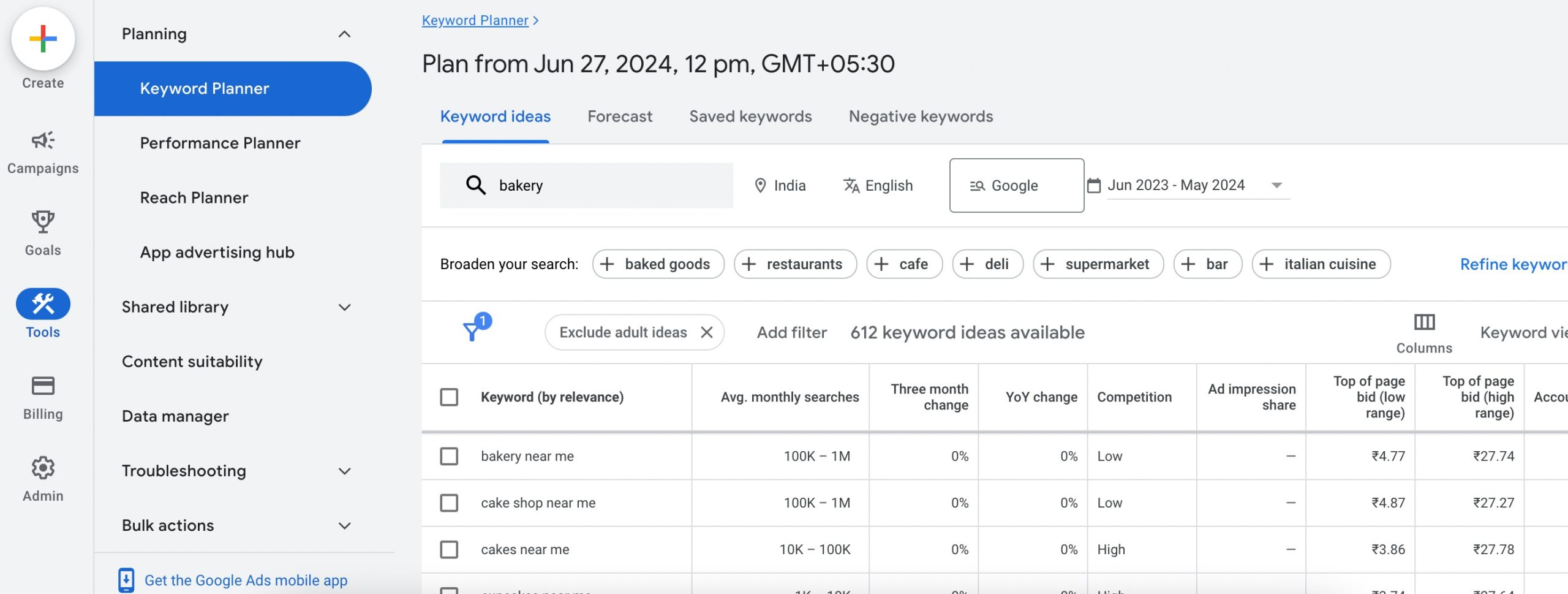
Next, use the location filter to specify the geographic area you are targeting. For instance, if your bakery is in Minneapolis, you can set the location to Minneapolis or the surrounding Twin Cities area. This ensures that the keyword suggestions you receive are according to your local customer base.
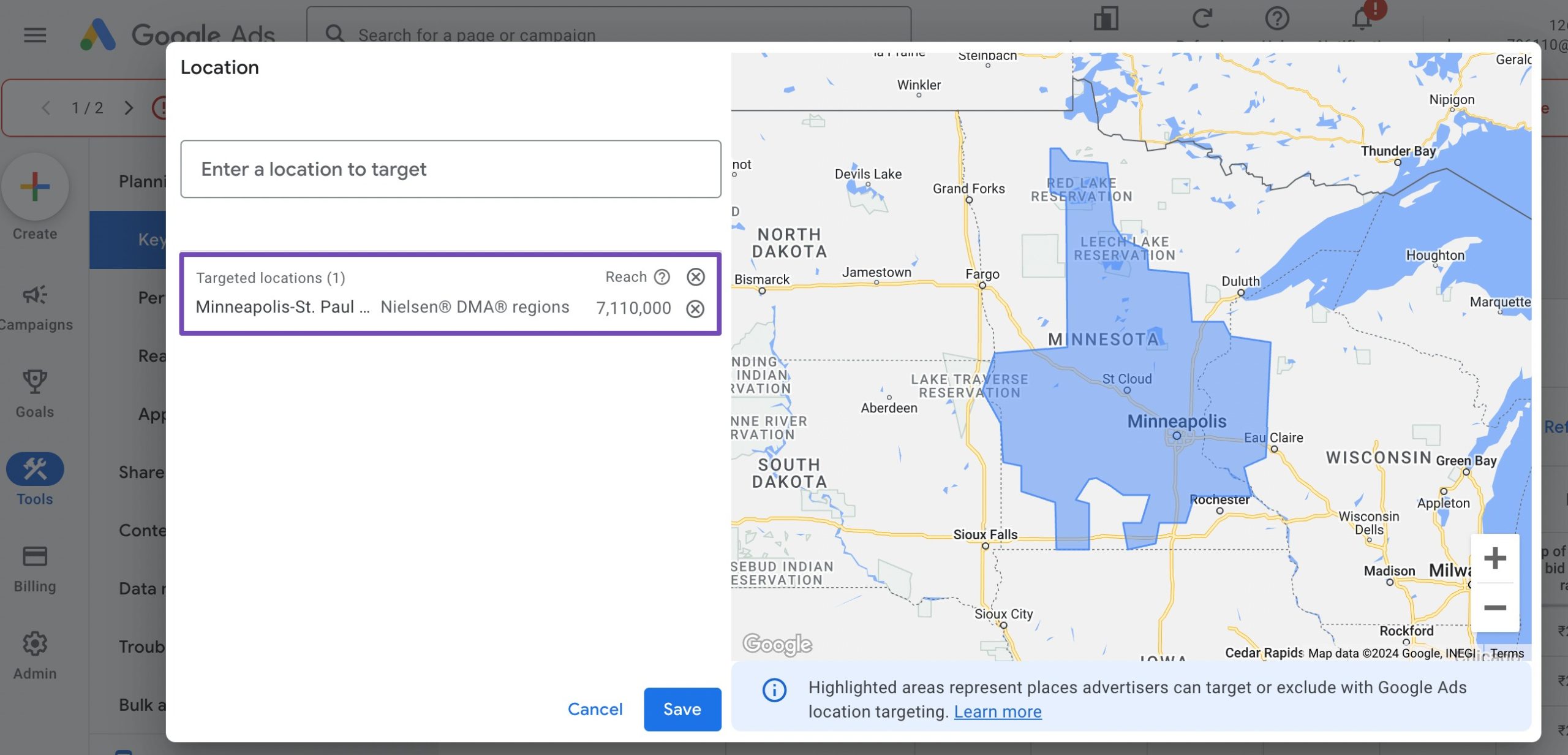
Google Keyword Planner will then generate a list of related keywords, complete with metrics such as search volumes and competition levels specific to your chosen location.
Look for keywords that reflect local search intent, such as best bakery in Minneapolis, gluten free bakery in Minneapolis, or gluten-free pastries St. Paul, etc.
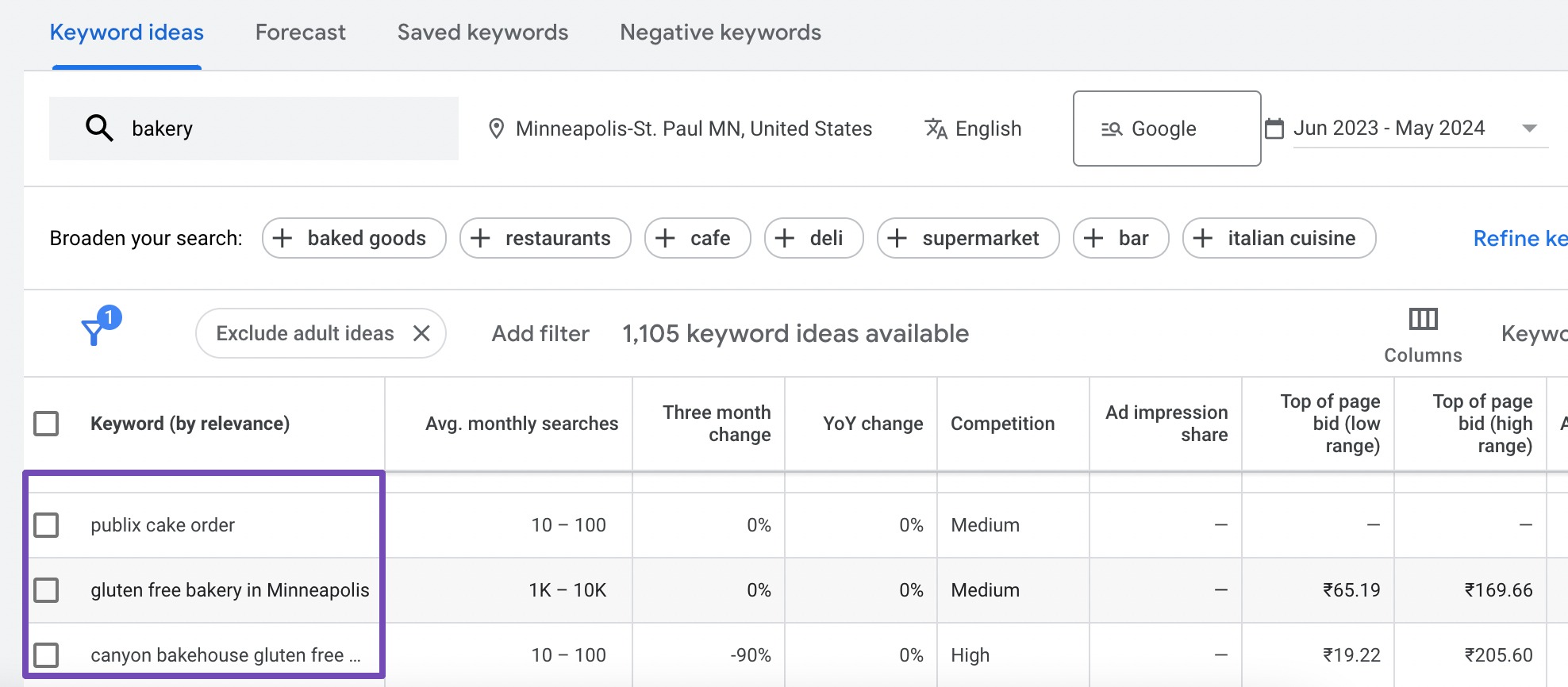
Pay attention to long-tail keywords as well, which are more specific and can capture niche customer searches. These long-tail keywords often have lower competition and higher conversion rates because they directly match what potential customers are looking for.
Lastly, consider local events or seasonal trends that may impact keyword popularity. For instance, during holidays like Valentine’s Day or Thanksgiving, keywords related to special holiday treats or gift ideas can attract significant local traffic.
Include these identified keywords strategically into your website content, blog posts, and social media profiles to enhance local SEO visibility.
Refer to our dedicated tutorial on keyword research to find relevant keywords and boost your online presence.
3.3 Check Local Metrics
Local metrics, such as search volume, competition level, and cost-per-click (CPC), help you understand how often specific keywords are searched for locally, how competitive they are, and their potential cost in paid advertising campaigns.
In the Google Keyword Planner, navigate to Get search volume and forecasts and add your keywords/services. Next, change the location to your service area.
This will give you an accurate picture of how often the audience in your target area searches for specific terms.
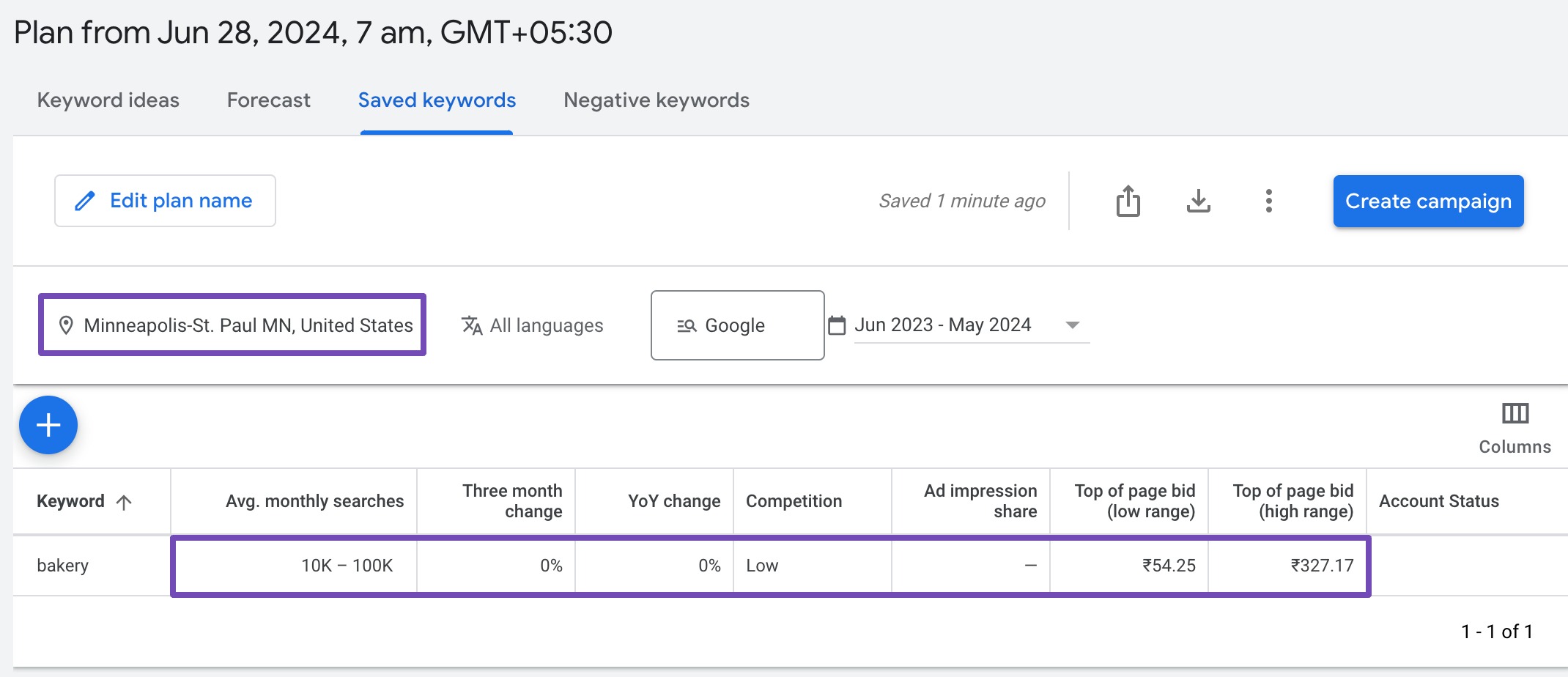
High search volume indicates a strong interest, suggesting that targeting these keywords can drive significant local traffic to your business.
Next, evaluate the competition level of each keyword. Keywords with high competition mean many businesses are targeting them, which can make it challenging to rank highly in search results. Conversely, keywords with low competition might offer easier opportunities for ranking, though they may have lower search volumes.
Striking a balance between search volume and competition is key to choosing effective keywords.
Additionally, consider the cost-per-click (CPC) if you plan to run paid advertising campaigns. High CPC values indicate valuable and competitive keywords, but they also suggest a higher cost for each click in your ads.
3.4 Check Competitor’s Ranking
Checking competitors’ rankings provides insights into which keywords are driving traffic to similar businesses in your area and helps you identify opportunities to improve your own SEO strategy.

Start by identifying your main local competitors. These are businesses offering similar products or services in your geographic region.
Once you have your list of competitors, use tools like Ahrefs and Semrush to analyze their websites. These tools allow you to see the keywords your competitors rank for, their positions in search results, and the estimated traffic those keywords bring in.
Refer to our dedicated tutorial on competitor analysis tools to help you check your competitor’s ranking.
Pay attention to high-ranking keywords, especially those with significant search volumes and relevance to your business.
Another important aspect is to check the competitors’ local SEO practices. Look at their Google Business Profiles, customer reviews, and local citations. See how they optimize their business listings with keywords, manage customer feedback, and maintain their online presence in local directories.
3.5 Group and Map Keywords to URLs
Grouping and mapping keywords to URLs is an important step in local keyword research. This process involves categorizing your keywords into logical groups and assigning them to specific pages on your website.
Start by reviewing your list of keywords and grouping them based on themes or topics. For instance, if you own a bakery, you can have groups for different types of products, such as cakes, bread, pastries, and cookies.
Each group should contain keywords that are closely related and can naturally fit within the same category. For instance, under cakes, you can include keywords like wedding cakes, birthday cakes, and custom cakes.
Once you have grouped your keywords, the next step is to map these groups to specific URLs on your website. Each group should correspond to a dedicated page optimized for the relevant keywords.
This ensures that each page targets a specific set of keywords, improving its relevance and chances of ranking well in search results.
For instance, the cakes keyword group can be mapped to a page specifically about cakes, where you can include detailed information, images, and descriptions about the various cakes you offer.
Rank Math makes it very simple to implement Local Business Schema Markup, displaying your business locations, or more.
It’s important to ensure that each page is well-optimized for its target keywords. This involves incorporating the keywords into key areas of the page, such as the title tag, meta description, headers, and throughout the content.
Additionally, each page should provide valuable and relevant information that addresses the search intent behind the keywords.
You can use Content AI to optimize your content for local rankings. AI is helping 47% of users produce content faster, and 35% are shifting their focus from quantity to quality
Mapping keywords to URLs also helps prevent keyword cannibalization, where multiple pages compete for the same keyword and dilute each other’s ranking potential.
4 Frequently Asked Questions
How many local keywords should I target per page?
Focus on one primary local keyword and a few closely related variations per page to avoid keyword stuffing and maintain relevance.
Can I rank for multiple locations with the same page?
It’s better to create separate, location-specific pages for each city or service area to improve relevance and ranking potential.
Can local keyword research help increase conversions?
Yes. Local keywords attract users with high intent, making them more likely to visit, call, or purchase from your business.
Is local keyword research useful for service-area businesses?
Absolutely. Service-area businesses can target keywords related to the locations they serve, even if they don’t have a physical storefront.
How often should I update my local keyword lists?
Review and refresh your local keyword research periodically, especially before major campaigns or content updates, since search behaviour and competition can change over time
5 Conclusion
Understanding local keyword research is essential to improve visibility and attract more customers from your local area.
By understanding the importance of targeting local keywords and brainstorming initial keywords based on your business and customer feedback, you can uncover valuable search terms that match your local audience.
Additionally, checking local metrics, analyzing competitors’ rankings, and organizing your keywords by grouping and mapping them to specific URLs will further enhance your SEO strategy.
Implement these strategies consistently, and you’ll see significant improvements in your local search rankings and overall online presence.
If you like this post, let us know by Tweeting @rankmathseo.
